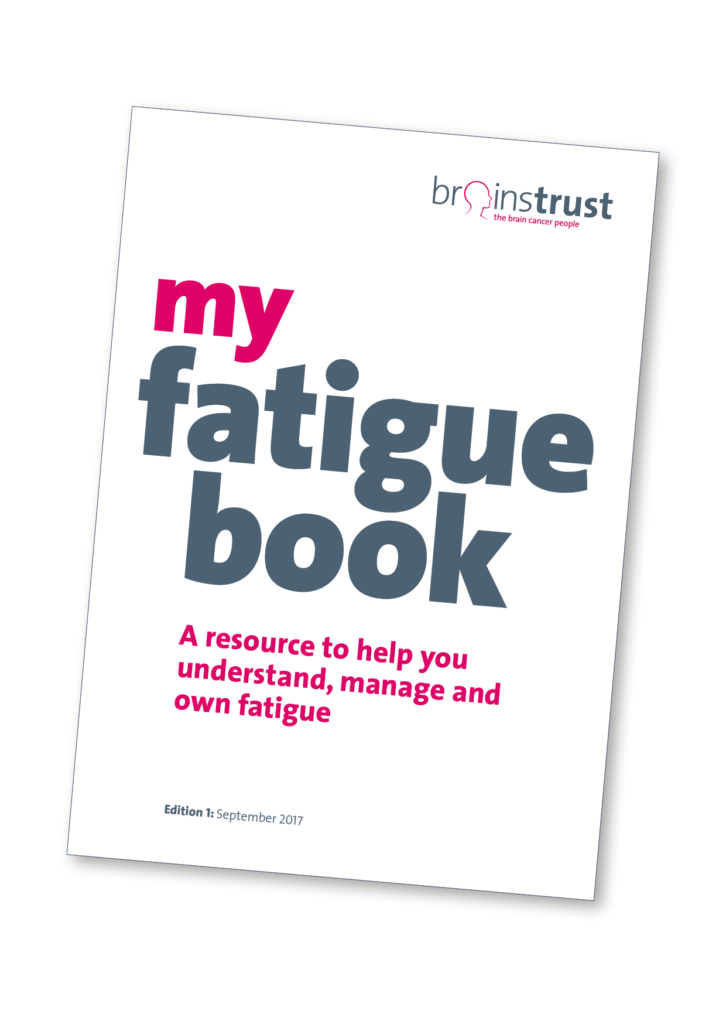Helping children live well with fatigue
What we mean by ‘fatigue’
Fatigue is a physical, emotional and/or mental tiredness that does not go away completely. It is often experienced as overwhelming. It is very different from everyday tiredness, because it lasts longer and can come on without warning. It has a big influence on everyday activities and can make even small chores or routine tasks seem impossible.
Fatigue can last for a very long time (months to years), even after completing treatment for a brain tumour. Fatigue is known to be one of the most difficult side effects of brain injury and cancer treatment.
We were kindly provided some insight about how to manage fatigue by the head occupational therapist at Royal Marsden Hospital, Maria Denise Pessoa. Occupational therapists hold a wealth of information to help your child live well beyond a brain tumour diagnosis. Get in touch with your clinical team to organise an appointment to see one.
The 5 Ps of Energy Conservation
Fatigue is a very prevalent, distressing and persistent symptom in children and teenagers with brain tumours. It can be caused by the tumour itself, but it can also be caused by treatment, including surgery, chemotherapy and radiotherapy.
Unfortunately, we cannot cure brain tumour–related fatigue, but we have some tools to manage it. One of the strategies that may work for you or your child is using the 5 Ps of energy conservation:
Planning
Planning actually means writing up a plan or schedule of the activities that are intended to be accomplished on a given day. When writing the activities down, it is useful to try to identify which activities will demand more or less energy. It is helpful to think that activities that include standing up, moving around or maintaining concentration for long periods of time are the ones that demand more energy.
Prioritising
There is no secret to this one. Prioritising actually means choosing the most important activities from your plan. This means focusing on the most important tasks and perhaps identifying the ones that may be postponed or delegated to someone else to do or help with. When prioritising, remember that the most important activity for you may not be the most important activity for your child. The more motivated the child is to perform a certain task, the more likely they are to be inclined to complete it.
Pacing
Pacing has two different aspects in fatigue management. One of them is indeed not rushing and allowing the child to take their time to complete a certain task, explaining to them that it is okay to do tasks more slowly and to not complete a certain task as quickly as their siblings or friends. The second aspect of pacing is to introduce regular breaks and time for recovery, especially during longer activities, such as going out to the park or attending school. If your child is struggling to accept that they need to stop and recover, try implementing some routine in which rest is reframed as a fun task, such as yoga time, a meditation session or playing ‘sit still like a frog’ with eyes closed.
Positioning
Positioning is all about being aware of which position your child will adopt when performing a certain task. Opt for positions that involve sitting down rather than standing up and those that offer support to other areas of the body, such as their backs and arms. When we choose supportive positions for a certain task, the child is able to focus more energy on the task itself rather than waste their energy trying to maintain their position standing up or walking around. If your child wants to do some baking, for example, it is a good idea to have them sitting at the table with all ingredients within their reach. This way, your child will focus on the activity and direct their energy to the tasks rather than waste the energy standing up and walking around the kitchen to fetch ingredients. Your occupational therapist can help you with identifying which equipment might benefit your child and help them save energy in everyday activities, such as showering and going to school.
Permission
Permission also has two different aspects when it comes to energy conservation. One of them is understanding that it is okay to ask for help and for your child to allow themselves to be assisted by someone else. The other aspect of permission is having a chat with your child and explaining that they are allowed to have a rest and break times, and that they are not expected to perform or be as quick as other kids or their siblings.
Our fatigue toolkit
This resource is really important as it enables patients and caregivers living with a brain tumour to understand what is meant by fatigue and to self-manage brain cancer related fatigue. Find out more about our fatigue toolkit here.
You can download the fatigue book here, or to order a hard copy, email hello@brainstrust.org.uk.






